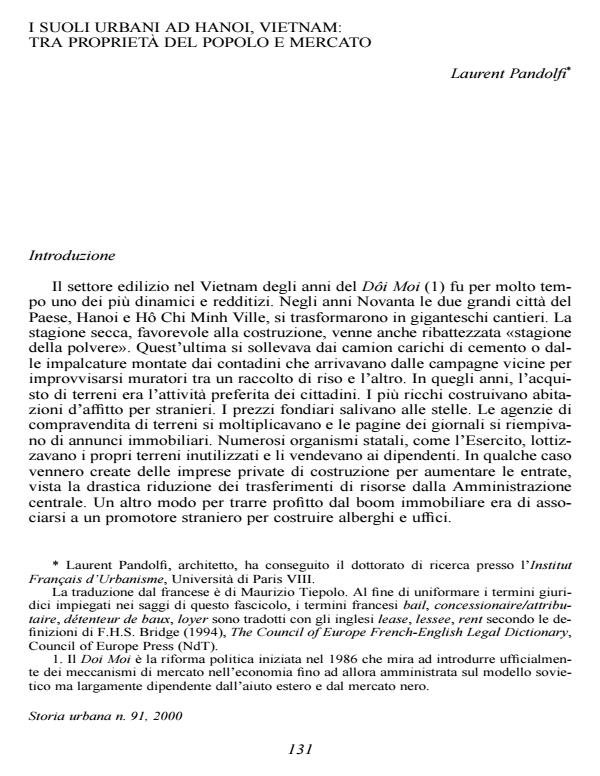I suoli urbani ad Hanoi, Vietnam: tra proprietà del popolo e mercato
Titolo Rivista STORIA URBANA
Autori/Curatori Laurent Pandolfi
Anno di pubblicazione 1 Fascicolo 2000/91 Lingua Italiano
Numero pagine 32 P. Dimensione file 445 KB
DOI
Il DOI è il codice a barre della proprietà intellettuale: per saperne di più
clicca qui
Qui sotto puoi vedere in anteprima la prima pagina di questo articolo.
Se questo articolo ti interessa, lo puoi acquistare (e scaricare in formato pdf) seguendo le facili indicazioni per acquistare il download credit. Acquista Download Credits per scaricare questo Articolo in formato PDF

FrancoAngeli è membro della Publishers International Linking Association, Inc (PILA)associazione indipendente e non profit per facilitare (attraverso i servizi tecnologici implementati da CrossRef.org) l’accesso degli studiosi ai contenuti digitali nelle pubblicazioni professionali e scientifiche
In 1986, Vietnam’s government introduced «market socialism» reforms in economy. In particular, it authorized the households to build and sell their own houses and it recognize the land use rights of households on the only land attached to their houses. Nevertheless, this decision led to black market transactions on the public and unused land as well as agricultural land on the urban fringe. Beside this, in 1994, the government replaced the administrative allocation of land to public enterprises and organizations by the rent of land without any right of transfer. In 1998, under pressure, the government couldn’t but modify the land law towards a leasehold system. This unstable legal framework favored the «land fever» on the black market. High demand for housing, investment in land and speculation are the main reasons of the land price rise. The high standard offices and hotel construction market develop frenetically in the early 1990’s before an overproduction crash. Joint venture with foreign investors were the more active on this market. Although they have to rent the land use rights to provinces at official (i.e. non market) price, they compete de facto on an invisible market to get most profitable land.;
Laurent Pandolfi, I suoli urbani ad Hanoi, Vietnam: tra proprietà del popolo e mercato in "STORIA URBANA " 91/2000, pp , DOI: